Operations Management in Coca Cola Company | Desklib
VerifiedAdded on 2022/11/03
|16
|4213
|468
AI Summary
This report provides a brief discussion of the process by which operations management contributes to strategy, along with its contribution to the Coca-Cola Company. Learn about the operations management in Coca Cola Company, including lean & six sigma, capacity management, and current issues in the industry.
Contribute Materials
Your contribution can guide someone’s learning journey. Share your
documents today.
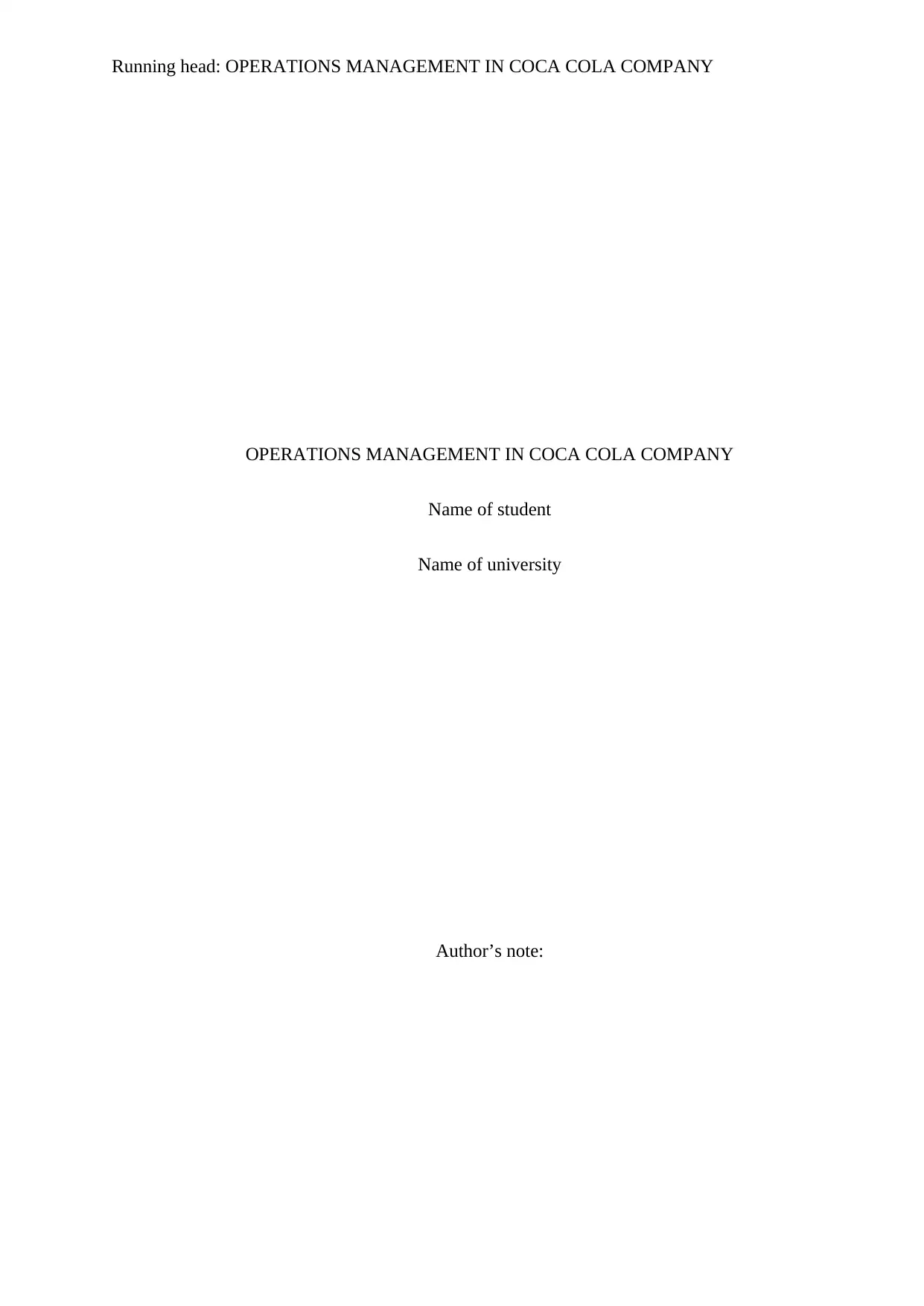
Running head: OPERATIONS MANAGEMENT IN COCA COLA COMPANY
OPERATIONS MANAGEMENT IN COCA COLA COMPANY
Name of student
Name of university
Author’s note:
OPERATIONS MANAGEMENT IN COCA COLA COMPANY
Name of student
Name of university
Author’s note:
Secure Best Marks with AI Grader
Need help grading? Try our AI Grader for instant feedback on your assignments.
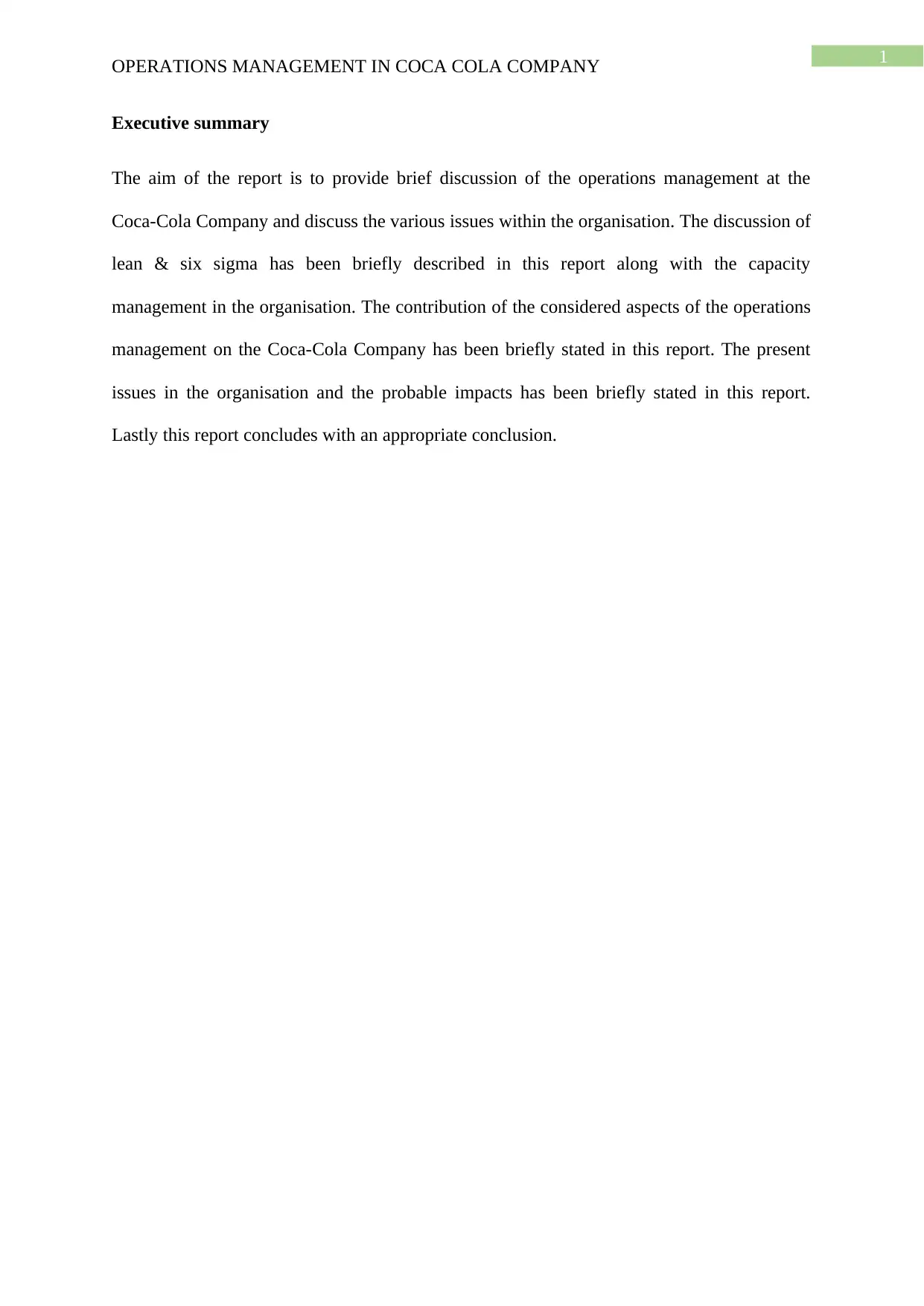
1
OPERATIONS MANAGEMENT IN COCA COLA COMPANY
Executive summary
The aim of the report is to provide brief discussion of the operations management at the
Coca-Cola Company and discuss the various issues within the organisation. The discussion of
lean & six sigma has been briefly described in this report along with the capacity
management in the organisation. The contribution of the considered aspects of the operations
management on the Coca-Cola Company has been briefly stated in this report. The present
issues in the organisation and the probable impacts has been briefly stated in this report.
Lastly this report concludes with an appropriate conclusion.
OPERATIONS MANAGEMENT IN COCA COLA COMPANY
Executive summary
The aim of the report is to provide brief discussion of the operations management at the
Coca-Cola Company and discuss the various issues within the organisation. The discussion of
lean & six sigma has been briefly described in this report along with the capacity
management in the organisation. The contribution of the considered aspects of the operations
management on the Coca-Cola Company has been briefly stated in this report. The present
issues in the organisation and the probable impacts has been briefly stated in this report.
Lastly this report concludes with an appropriate conclusion.
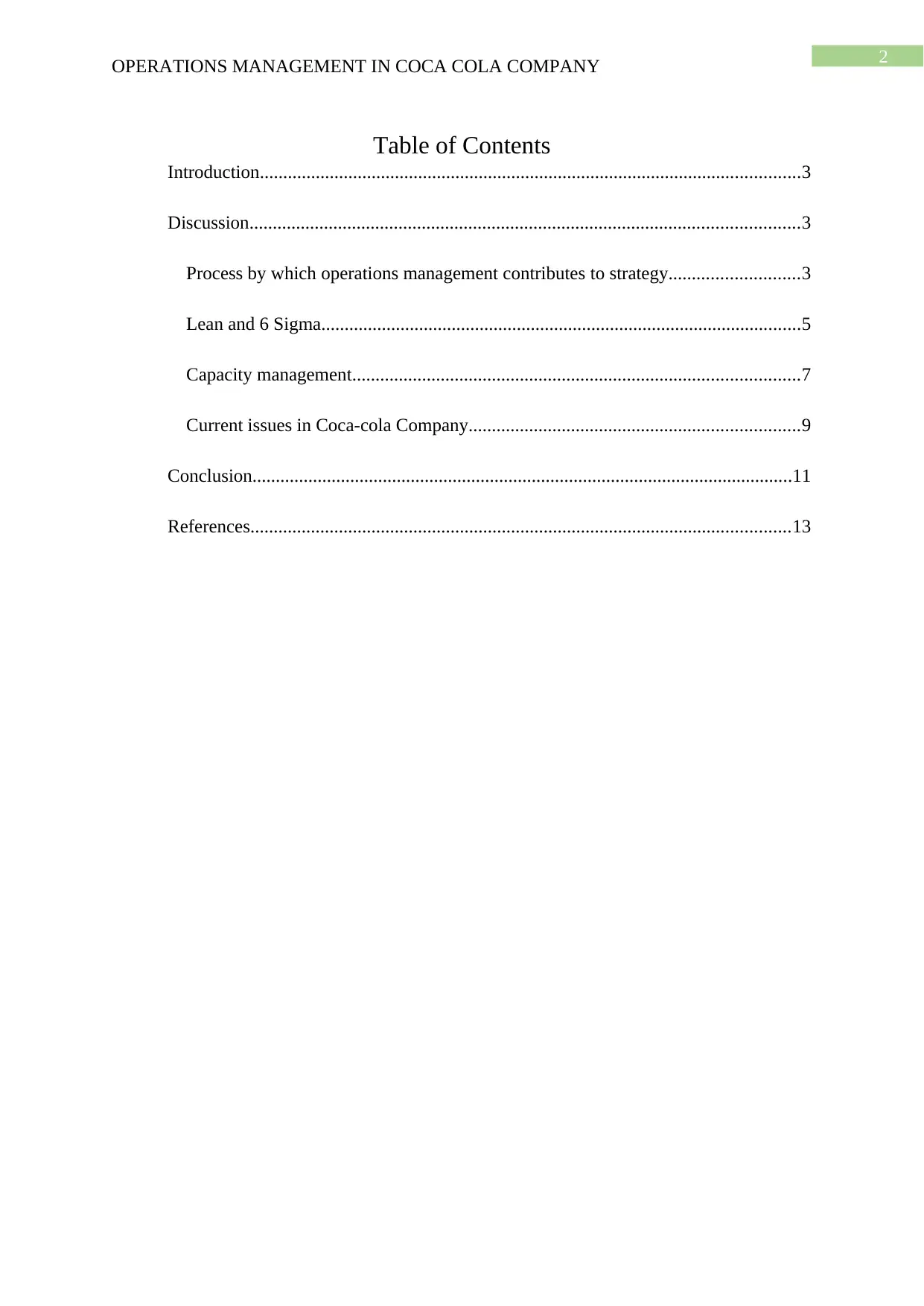
2
OPERATIONS MANAGEMENT IN COCA COLA COMPANY
Table of Contents
Introduction....................................................................................................................3
Discussion......................................................................................................................3
Process by which operations management contributes to strategy............................3
Lean and 6 Sigma.......................................................................................................5
Capacity management................................................................................................7
Current issues in Coca-cola Company.......................................................................9
Conclusion....................................................................................................................11
References....................................................................................................................13
OPERATIONS MANAGEMENT IN COCA COLA COMPANY
Table of Contents
Introduction....................................................................................................................3
Discussion......................................................................................................................3
Process by which operations management contributes to strategy............................3
Lean and 6 Sigma.......................................................................................................5
Capacity management................................................................................................7
Current issues in Coca-cola Company.......................................................................9
Conclusion....................................................................................................................11
References....................................................................................................................13
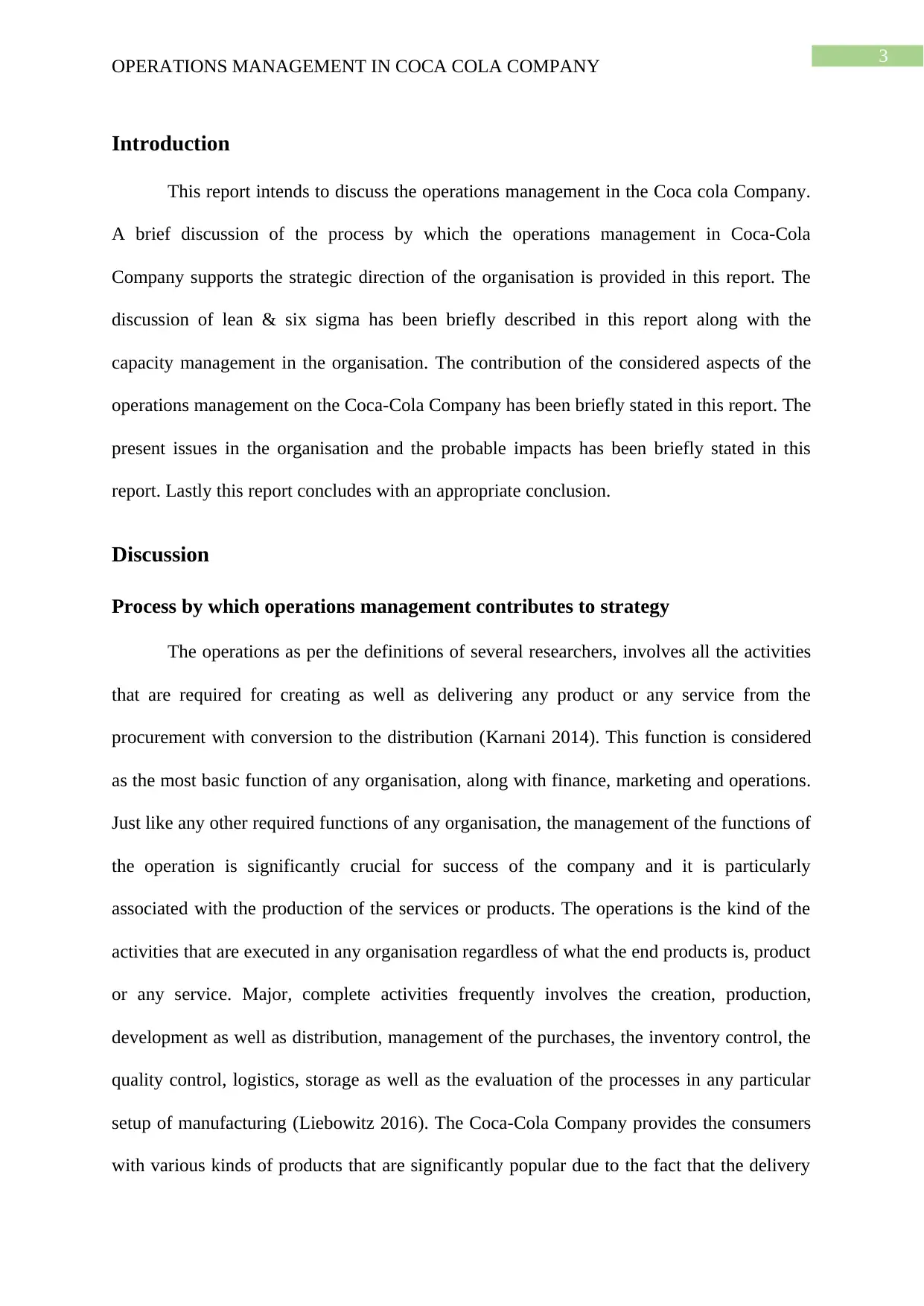
3
OPERATIONS MANAGEMENT IN COCA COLA COMPANY
Introduction
This report intends to discuss the operations management in the Coca cola Company.
A brief discussion of the process by which the operations management in Coca-Cola
Company supports the strategic direction of the organisation is provided in this report. The
discussion of lean & six sigma has been briefly described in this report along with the
capacity management in the organisation. The contribution of the considered aspects of the
operations management on the Coca-Cola Company has been briefly stated in this report. The
present issues in the organisation and the probable impacts has been briefly stated in this
report. Lastly this report concludes with an appropriate conclusion.
Discussion
Process by which operations management contributes to strategy
The operations as per the definitions of several researchers, involves all the activities
that are required for creating as well as delivering any product or any service from the
procurement with conversion to the distribution (Karnani 2014). This function is considered
as the most basic function of any organisation, along with finance, marketing and operations.
Just like any other required functions of any organisation, the management of the functions of
the operation is significantly crucial for success of the company and it is particularly
associated with the production of the services or products. The operations is the kind of the
activities that are executed in any organisation regardless of what the end products is, product
or any service. Major, complete activities frequently involves the creation, production,
development as well as distribution, management of the purchases, the inventory control, the
quality control, logistics, storage as well as the evaluation of the processes in any particular
setup of manufacturing (Liebowitz 2016). The Coca-Cola Company provides the consumers
with various kinds of products that are significantly popular due to the fact that the delivery
OPERATIONS MANAGEMENT IN COCA COLA COMPANY
Introduction
This report intends to discuss the operations management in the Coca cola Company.
A brief discussion of the process by which the operations management in Coca-Cola
Company supports the strategic direction of the organisation is provided in this report. The
discussion of lean & six sigma has been briefly described in this report along with the
capacity management in the organisation. The contribution of the considered aspects of the
operations management on the Coca-Cola Company has been briefly stated in this report. The
present issues in the organisation and the probable impacts has been briefly stated in this
report. Lastly this report concludes with an appropriate conclusion.
Discussion
Process by which operations management contributes to strategy
The operations as per the definitions of several researchers, involves all the activities
that are required for creating as well as delivering any product or any service from the
procurement with conversion to the distribution (Karnani 2014). This function is considered
as the most basic function of any organisation, along with finance, marketing and operations.
Just like any other required functions of any organisation, the management of the functions of
the operation is significantly crucial for success of the company and it is particularly
associated with the production of the services or products. The operations is the kind of the
activities that are executed in any organisation regardless of what the end products is, product
or any service. Major, complete activities frequently involves the creation, production,
development as well as distribution, management of the purchases, the inventory control, the
quality control, logistics, storage as well as the evaluation of the processes in any particular
setup of manufacturing (Liebowitz 2016). The Coca-Cola Company provides the consumers
with various kinds of products that are significantly popular due to the fact that the delivery
Secure Best Marks with AI Grader
Need help grading? Try our AI Grader for instant feedback on your assignments.
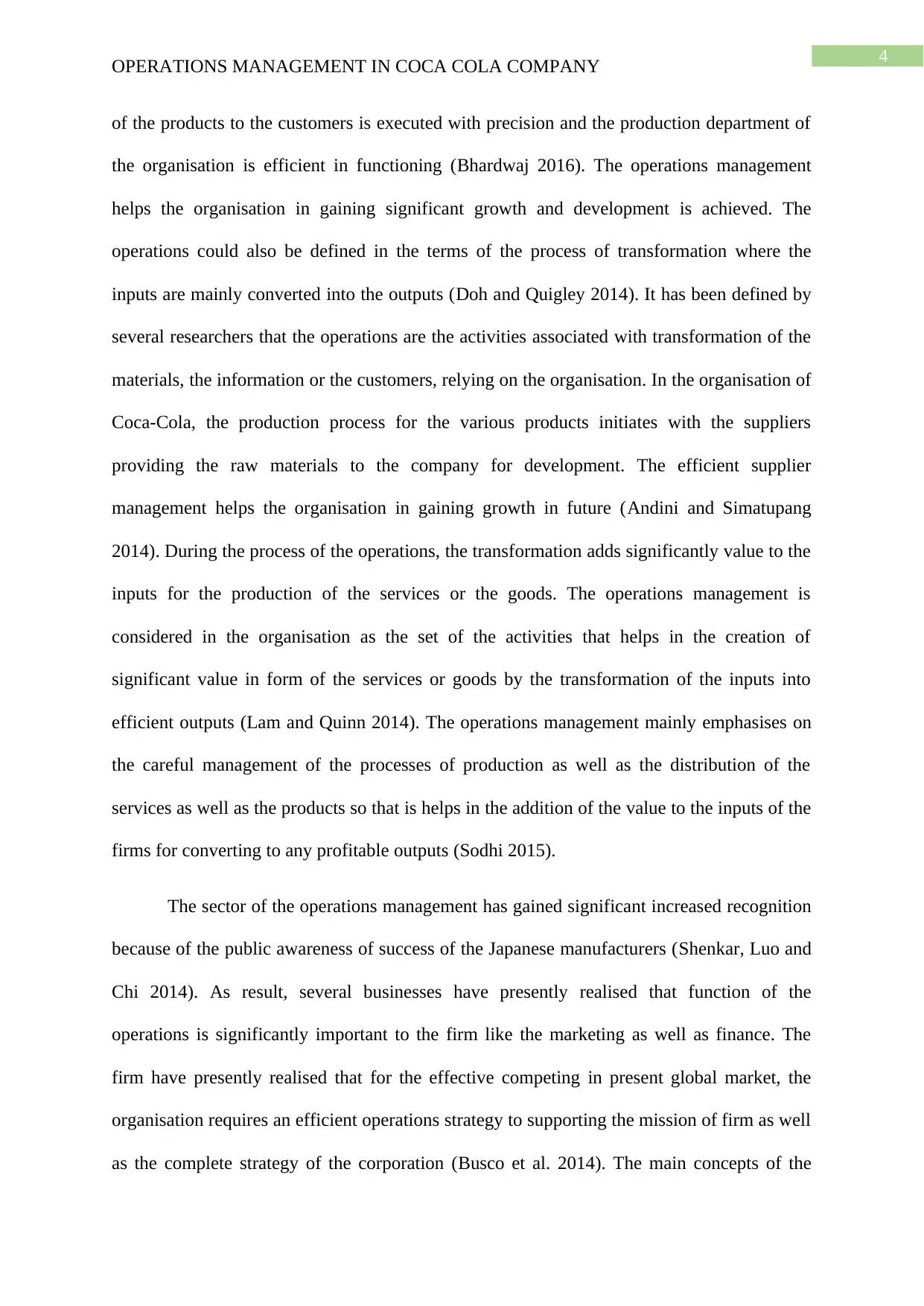
4
OPERATIONS MANAGEMENT IN COCA COLA COMPANY
of the products to the customers is executed with precision and the production department of
the organisation is efficient in functioning (Bhardwaj 2016). The operations management
helps the organisation in gaining significant growth and development is achieved. The
operations could also be defined in the terms of the process of transformation where the
inputs are mainly converted into the outputs (Doh and Quigley 2014). It has been defined by
several researchers that the operations are the activities associated with transformation of the
materials, the information or the customers, relying on the organisation. In the organisation of
Coca-Cola, the production process for the various products initiates with the suppliers
providing the raw materials to the company for development. The efficient supplier
management helps the organisation in gaining growth in future (Andini and Simatupang
2014). During the process of the operations, the transformation adds significantly value to the
inputs for the production of the services or the goods. The operations management is
considered in the organisation as the set of the activities that helps in the creation of
significant value in form of the services or goods by the transformation of the inputs into
efficient outputs (Lam and Quinn 2014). The operations management mainly emphasises on
the careful management of the processes of production as well as the distribution of the
services as well as the products so that is helps in the addition of the value to the inputs of the
firms for converting to any profitable outputs (Sodhi 2015).
The sector of the operations management has gained significant increased recognition
because of the public awareness of success of the Japanese manufacturers (Shenkar, Luo and
Chi 2014). As result, several businesses have presently realised that function of the
operations is significantly important to the firm like the marketing as well as finance. The
firm have presently realised that for the effective competing in present global market, the
organisation requires an efficient operations strategy to supporting the mission of firm as well
as the complete strategy of the corporation (Busco et al. 2014). The main concepts of the
OPERATIONS MANAGEMENT IN COCA COLA COMPANY
of the products to the customers is executed with precision and the production department of
the organisation is efficient in functioning (Bhardwaj 2016). The operations management
helps the organisation in gaining significant growth and development is achieved. The
operations could also be defined in the terms of the process of transformation where the
inputs are mainly converted into the outputs (Doh and Quigley 2014). It has been defined by
several researchers that the operations are the activities associated with transformation of the
materials, the information or the customers, relying on the organisation. In the organisation of
Coca-Cola, the production process for the various products initiates with the suppliers
providing the raw materials to the company for development. The efficient supplier
management helps the organisation in gaining growth in future (Andini and Simatupang
2014). During the process of the operations, the transformation adds significantly value to the
inputs for the production of the services or the goods. The operations management is
considered in the organisation as the set of the activities that helps in the creation of
significant value in form of the services or goods by the transformation of the inputs into
efficient outputs (Lam and Quinn 2014). The operations management mainly emphasises on
the careful management of the processes of production as well as the distribution of the
services as well as the products so that is helps in the addition of the value to the inputs of the
firms for converting to any profitable outputs (Sodhi 2015).
The sector of the operations management has gained significant increased recognition
because of the public awareness of success of the Japanese manufacturers (Shenkar, Luo and
Chi 2014). As result, several businesses have presently realised that function of the
operations is significantly important to the firm like the marketing as well as finance. The
firm have presently realised that for the effective competing in present global market, the
organisation requires an efficient operations strategy to supporting the mission of firm as well
as the complete strategy of the corporation (Busco et al. 2014). The main concepts of the
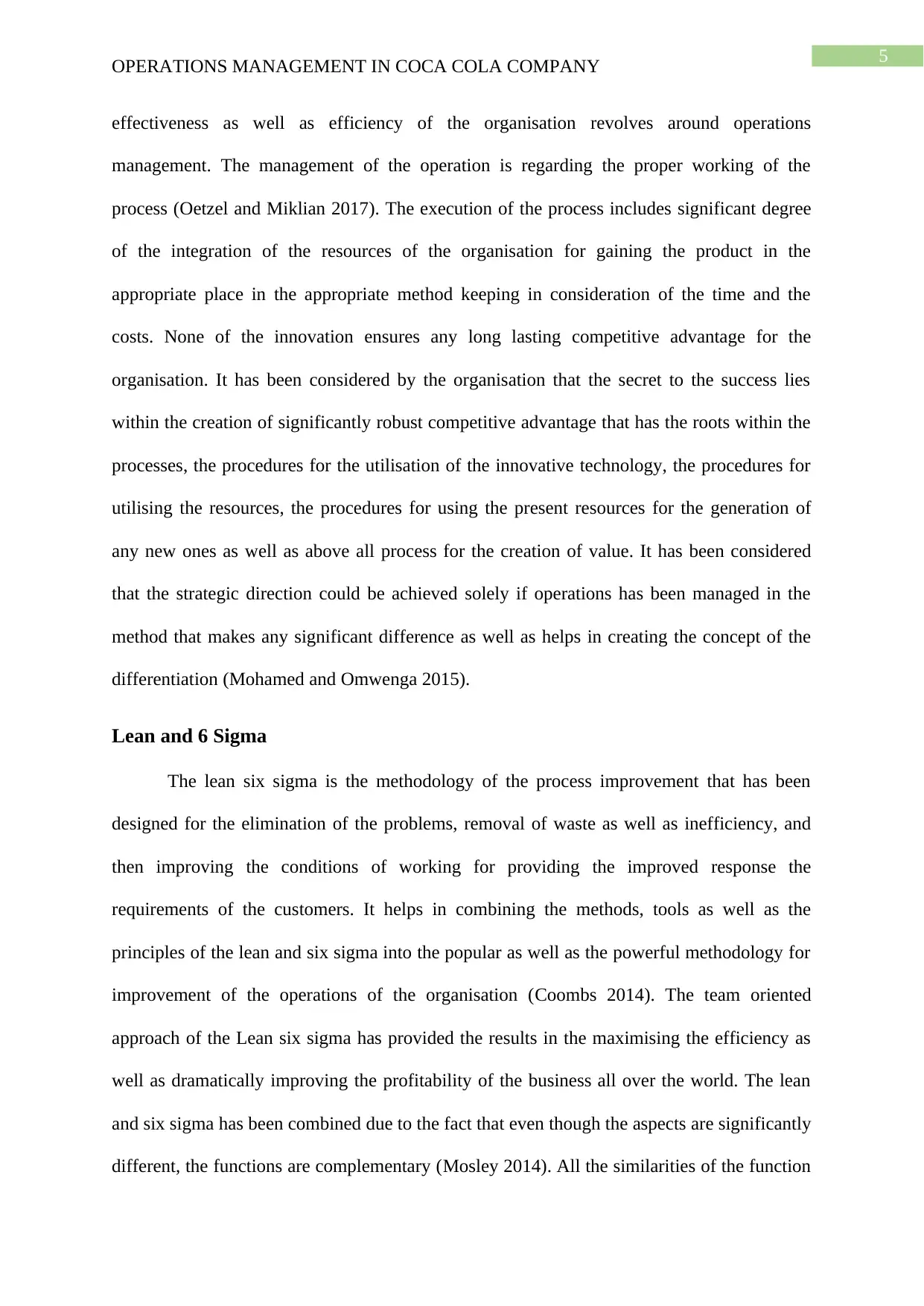
5
OPERATIONS MANAGEMENT IN COCA COLA COMPANY
effectiveness as well as efficiency of the organisation revolves around operations
management. The management of the operation is regarding the proper working of the
process (Oetzel and Miklian 2017). The execution of the process includes significant degree
of the integration of the resources of the organisation for gaining the product in the
appropriate place in the appropriate method keeping in consideration of the time and the
costs. None of the innovation ensures any long lasting competitive advantage for the
organisation. It has been considered by the organisation that the secret to the success lies
within the creation of significantly robust competitive advantage that has the roots within the
processes, the procedures for the utilisation of the innovative technology, the procedures for
utilising the resources, the procedures for using the present resources for the generation of
any new ones as well as above all process for the creation of value. It has been considered
that the strategic direction could be achieved solely if operations has been managed in the
method that makes any significant difference as well as helps in creating the concept of the
differentiation (Mohamed and Omwenga 2015).
Lean and 6 Sigma
The lean six sigma is the methodology of the process improvement that has been
designed for the elimination of the problems, removal of waste as well as inefficiency, and
then improving the conditions of working for providing the improved response the
requirements of the customers. It helps in combining the methods, tools as well as the
principles of the lean and six sigma into the popular as well as the powerful methodology for
improvement of the operations of the organisation (Coombs 2014). The team oriented
approach of the Lean six sigma has provided the results in the maximising the efficiency as
well as dramatically improving the profitability of the business all over the world. The lean
and six sigma has been combined due to the fact that even though the aspects are significantly
different, the functions are complementary (Mosley 2014). All the similarities of the function
OPERATIONS MANAGEMENT IN COCA COLA COMPANY
effectiveness as well as efficiency of the organisation revolves around operations
management. The management of the operation is regarding the proper working of the
process (Oetzel and Miklian 2017). The execution of the process includes significant degree
of the integration of the resources of the organisation for gaining the product in the
appropriate place in the appropriate method keeping in consideration of the time and the
costs. None of the innovation ensures any long lasting competitive advantage for the
organisation. It has been considered by the organisation that the secret to the success lies
within the creation of significantly robust competitive advantage that has the roots within the
processes, the procedures for the utilisation of the innovative technology, the procedures for
utilising the resources, the procedures for using the present resources for the generation of
any new ones as well as above all process for the creation of value. It has been considered
that the strategic direction could be achieved solely if operations has been managed in the
method that makes any significant difference as well as helps in creating the concept of the
differentiation (Mohamed and Omwenga 2015).
Lean and 6 Sigma
The lean six sigma is the methodology of the process improvement that has been
designed for the elimination of the problems, removal of waste as well as inefficiency, and
then improving the conditions of working for providing the improved response the
requirements of the customers. It helps in combining the methods, tools as well as the
principles of the lean and six sigma into the popular as well as the powerful methodology for
improvement of the operations of the organisation (Coombs 2014). The team oriented
approach of the Lean six sigma has provided the results in the maximising the efficiency as
well as dramatically improving the profitability of the business all over the world. The lean
and six sigma has been combined due to the fact that even though the aspects are significantly
different, the functions are complementary (Mosley 2014). All the similarities of the function
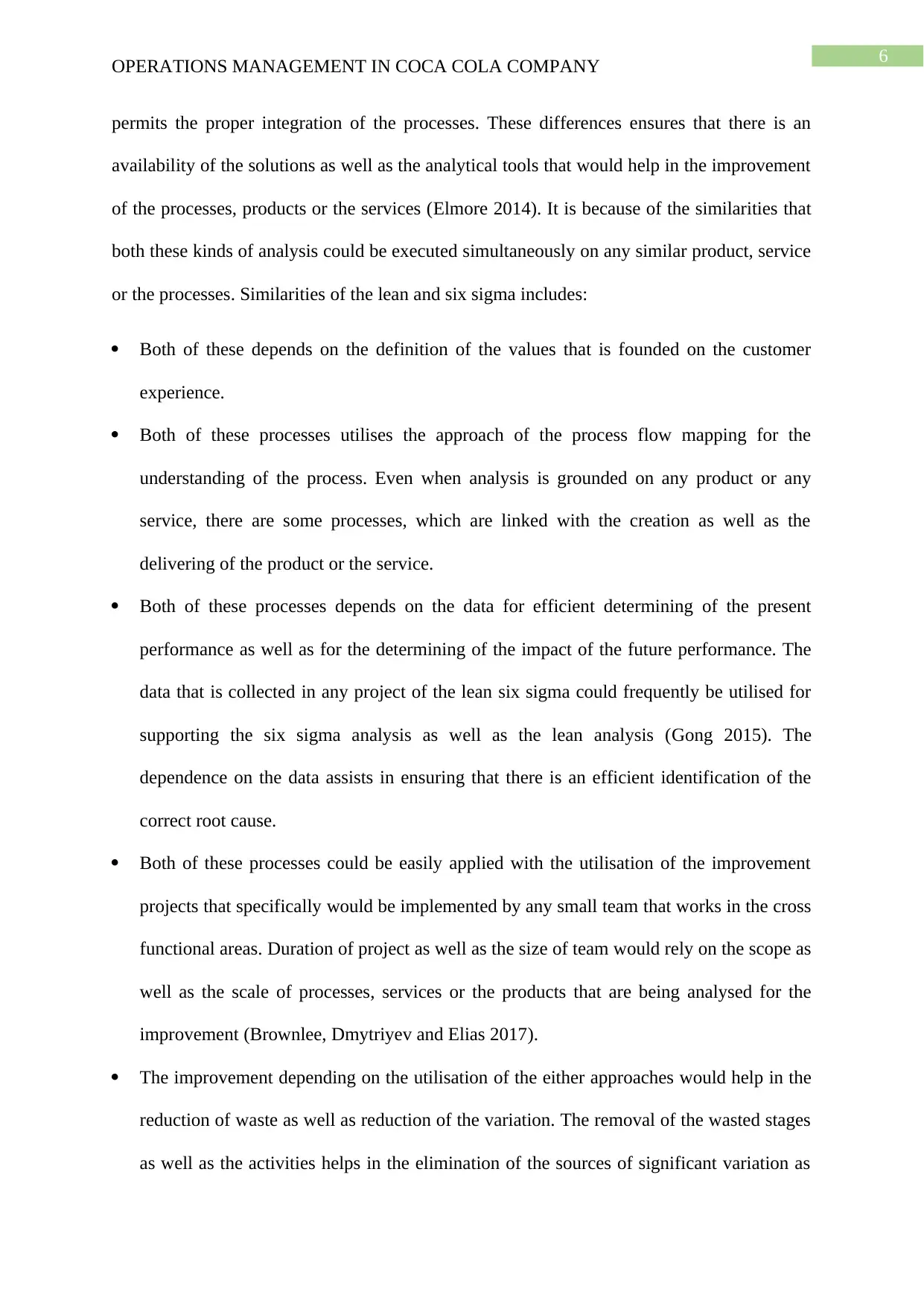
6
OPERATIONS MANAGEMENT IN COCA COLA COMPANY
permits the proper integration of the processes. These differences ensures that there is an
availability of the solutions as well as the analytical tools that would help in the improvement
of the processes, products or the services (Elmore 2014). It is because of the similarities that
both these kinds of analysis could be executed simultaneously on any similar product, service
or the processes. Similarities of the lean and six sigma includes:
Both of these depends on the definition of the values that is founded on the customer
experience.
Both of these processes utilises the approach of the process flow mapping for the
understanding of the process. Even when analysis is grounded on any product or any
service, there are some processes, which are linked with the creation as well as the
delivering of the product or the service.
Both of these processes depends on the data for efficient determining of the present
performance as well as for the determining of the impact of the future performance. The
data that is collected in any project of the lean six sigma could frequently be utilised for
supporting the six sigma analysis as well as the lean analysis (Gong 2015). The
dependence on the data assists in ensuring that there is an efficient identification of the
correct root cause.
Both of these processes could be easily applied with the utilisation of the improvement
projects that specifically would be implemented by any small team that works in the cross
functional areas. Duration of project as well as the size of team would rely on the scope as
well as the scale of processes, services or the products that are being analysed for the
improvement (Brownlee, Dmytriyev and Elias 2017).
The improvement depending on the utilisation of the either approaches would help in the
reduction of waste as well as reduction of the variation. The removal of the wasted stages
as well as the activities helps in the elimination of the sources of significant variation as
OPERATIONS MANAGEMENT IN COCA COLA COMPANY
permits the proper integration of the processes. These differences ensures that there is an
availability of the solutions as well as the analytical tools that would help in the improvement
of the processes, products or the services (Elmore 2014). It is because of the similarities that
both these kinds of analysis could be executed simultaneously on any similar product, service
or the processes. Similarities of the lean and six sigma includes:
Both of these depends on the definition of the values that is founded on the customer
experience.
Both of these processes utilises the approach of the process flow mapping for the
understanding of the process. Even when analysis is grounded on any product or any
service, there are some processes, which are linked with the creation as well as the
delivering of the product or the service.
Both of these processes depends on the data for efficient determining of the present
performance as well as for the determining of the impact of the future performance. The
data that is collected in any project of the lean six sigma could frequently be utilised for
supporting the six sigma analysis as well as the lean analysis (Gong 2015). The
dependence on the data assists in ensuring that there is an efficient identification of the
correct root cause.
Both of these processes could be easily applied with the utilisation of the improvement
projects that specifically would be implemented by any small team that works in the cross
functional areas. Duration of project as well as the size of team would rely on the scope as
well as the scale of processes, services or the products that are being analysed for the
improvement (Brownlee, Dmytriyev and Elias 2017).
The improvement depending on the utilisation of the either approaches would help in the
reduction of waste as well as reduction of the variation. The removal of the wasted stages
as well as the activities helps in the elimination of the sources of significant variation as
Paraphrase This Document
Need a fresh take? Get an instant paraphrase of this document with our AI Paraphraser
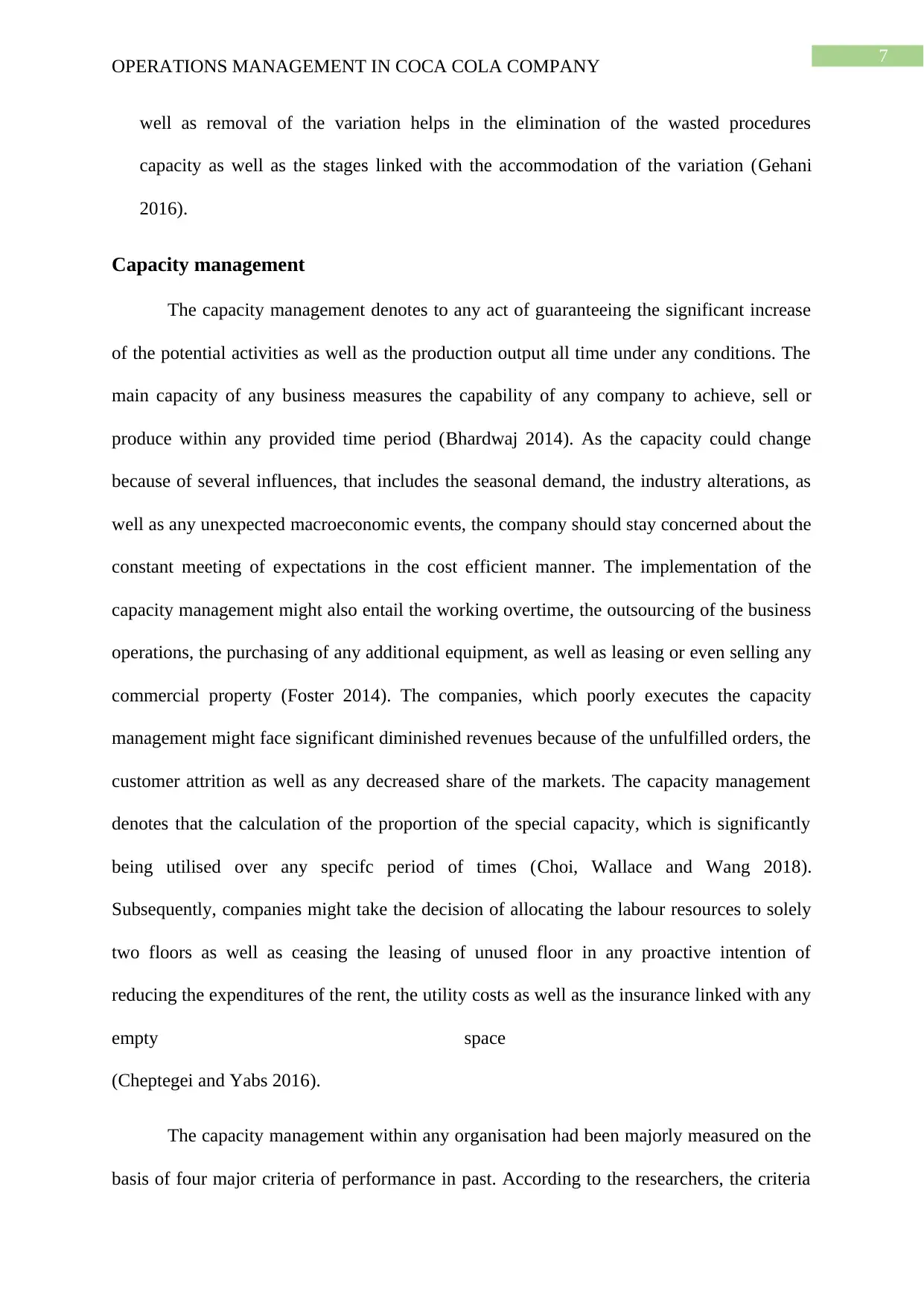
7
OPERATIONS MANAGEMENT IN COCA COLA COMPANY
well as removal of the variation helps in the elimination of the wasted procedures
capacity as well as the stages linked with the accommodation of the variation (Gehani
2016).
Capacity management
The capacity management denotes to any act of guaranteeing the significant increase
of the potential activities as well as the production output all time under any conditions. The
main capacity of any business measures the capability of any company to achieve, sell or
produce within any provided time period (Bhardwaj 2014). As the capacity could change
because of several influences, that includes the seasonal demand, the industry alterations, as
well as any unexpected macroeconomic events, the company should stay concerned about the
constant meeting of expectations in the cost efficient manner. The implementation of the
capacity management might also entail the working overtime, the outsourcing of the business
operations, the purchasing of any additional equipment, as well as leasing or even selling any
commercial property (Foster 2014). The companies, which poorly executes the capacity
management might face significant diminished revenues because of the unfulfilled orders, the
customer attrition as well as any decreased share of the markets. The capacity management
denotes that the calculation of the proportion of the special capacity, which is significantly
being utilised over any specifc period of times (Choi, Wallace and Wang 2018).
Subsequently, companies might take the decision of allocating the labour resources to solely
two floors as well as ceasing the leasing of unused floor in any proactive intention of
reducing the expenditures of the rent, the utility costs as well as the insurance linked with any
empty space
(Cheptegei and Yabs 2016).
The capacity management within any organisation had been majorly measured on the
basis of four major criteria of performance in past. According to the researchers, the criteria
OPERATIONS MANAGEMENT IN COCA COLA COMPANY
well as removal of the variation helps in the elimination of the wasted procedures
capacity as well as the stages linked with the accommodation of the variation (Gehani
2016).
Capacity management
The capacity management denotes to any act of guaranteeing the significant increase
of the potential activities as well as the production output all time under any conditions. The
main capacity of any business measures the capability of any company to achieve, sell or
produce within any provided time period (Bhardwaj 2014). As the capacity could change
because of several influences, that includes the seasonal demand, the industry alterations, as
well as any unexpected macroeconomic events, the company should stay concerned about the
constant meeting of expectations in the cost efficient manner. The implementation of the
capacity management might also entail the working overtime, the outsourcing of the business
operations, the purchasing of any additional equipment, as well as leasing or even selling any
commercial property (Foster 2014). The companies, which poorly executes the capacity
management might face significant diminished revenues because of the unfulfilled orders, the
customer attrition as well as any decreased share of the markets. The capacity management
denotes that the calculation of the proportion of the special capacity, which is significantly
being utilised over any specifc period of times (Choi, Wallace and Wang 2018).
Subsequently, companies might take the decision of allocating the labour resources to solely
two floors as well as ceasing the leasing of unused floor in any proactive intention of
reducing the expenditures of the rent, the utility costs as well as the insurance linked with any
empty space
(Cheptegei and Yabs 2016).
The capacity management within any organisation had been majorly measured on the
basis of four major criteria of performance in past. According to the researchers, the criteria
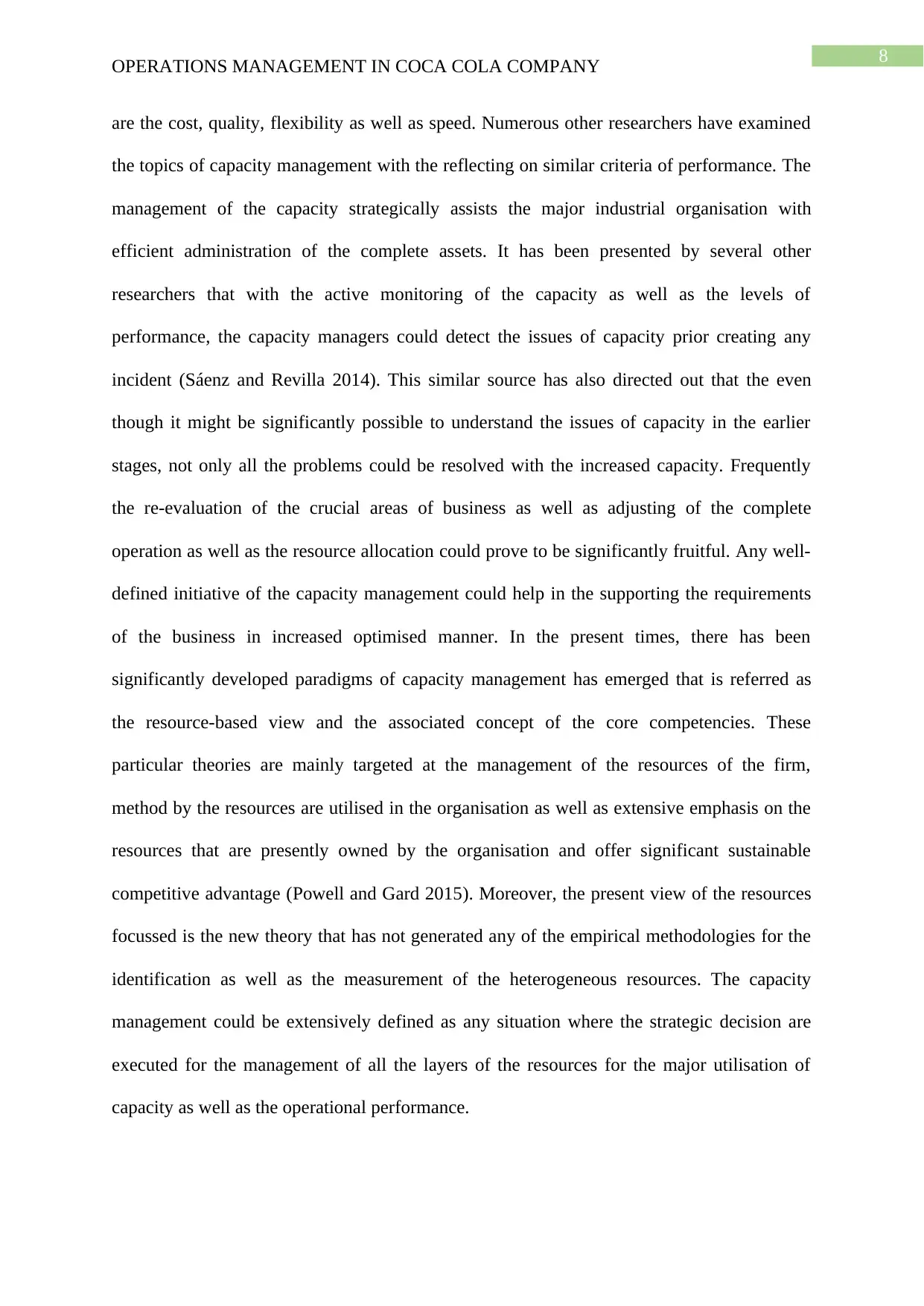
8
OPERATIONS MANAGEMENT IN COCA COLA COMPANY
are the cost, quality, flexibility as well as speed. Numerous other researchers have examined
the topics of capacity management with the reflecting on similar criteria of performance. The
management of the capacity strategically assists the major industrial organisation with
efficient administration of the complete assets. It has been presented by several other
researchers that with the active monitoring of the capacity as well as the levels of
performance, the capacity managers could detect the issues of capacity prior creating any
incident (Sáenz and Revilla 2014). This similar source has also directed out that the even
though it might be significantly possible to understand the issues of capacity in the earlier
stages, not only all the problems could be resolved with the increased capacity. Frequently
the re-evaluation of the crucial areas of business as well as adjusting of the complete
operation as well as the resource allocation could prove to be significantly fruitful. Any well-
defined initiative of the capacity management could help in the supporting the requirements
of the business in increased optimised manner. In the present times, there has been
significantly developed paradigms of capacity management has emerged that is referred as
the resource-based view and the associated concept of the core competencies. These
particular theories are mainly targeted at the management of the resources of the firm,
method by the resources are utilised in the organisation as well as extensive emphasis on the
resources that are presently owned by the organisation and offer significant sustainable
competitive advantage (Powell and Gard 2015). Moreover, the present view of the resources
focussed is the new theory that has not generated any of the empirical methodologies for the
identification as well as the measurement of the heterogeneous resources. The capacity
management could be extensively defined as any situation where the strategic decision are
executed for the management of all the layers of the resources for the major utilisation of
capacity as well as the operational performance.
OPERATIONS MANAGEMENT IN COCA COLA COMPANY
are the cost, quality, flexibility as well as speed. Numerous other researchers have examined
the topics of capacity management with the reflecting on similar criteria of performance. The
management of the capacity strategically assists the major industrial organisation with
efficient administration of the complete assets. It has been presented by several other
researchers that with the active monitoring of the capacity as well as the levels of
performance, the capacity managers could detect the issues of capacity prior creating any
incident (Sáenz and Revilla 2014). This similar source has also directed out that the even
though it might be significantly possible to understand the issues of capacity in the earlier
stages, not only all the problems could be resolved with the increased capacity. Frequently
the re-evaluation of the crucial areas of business as well as adjusting of the complete
operation as well as the resource allocation could prove to be significantly fruitful. Any well-
defined initiative of the capacity management could help in the supporting the requirements
of the business in increased optimised manner. In the present times, there has been
significantly developed paradigms of capacity management has emerged that is referred as
the resource-based view and the associated concept of the core competencies. These
particular theories are mainly targeted at the management of the resources of the firm,
method by the resources are utilised in the organisation as well as extensive emphasis on the
resources that are presently owned by the organisation and offer significant sustainable
competitive advantage (Powell and Gard 2015). Moreover, the present view of the resources
focussed is the new theory that has not generated any of the empirical methodologies for the
identification as well as the measurement of the heterogeneous resources. The capacity
management could be extensively defined as any situation where the strategic decision are
executed for the management of all the layers of the resources for the major utilisation of
capacity as well as the operational performance.
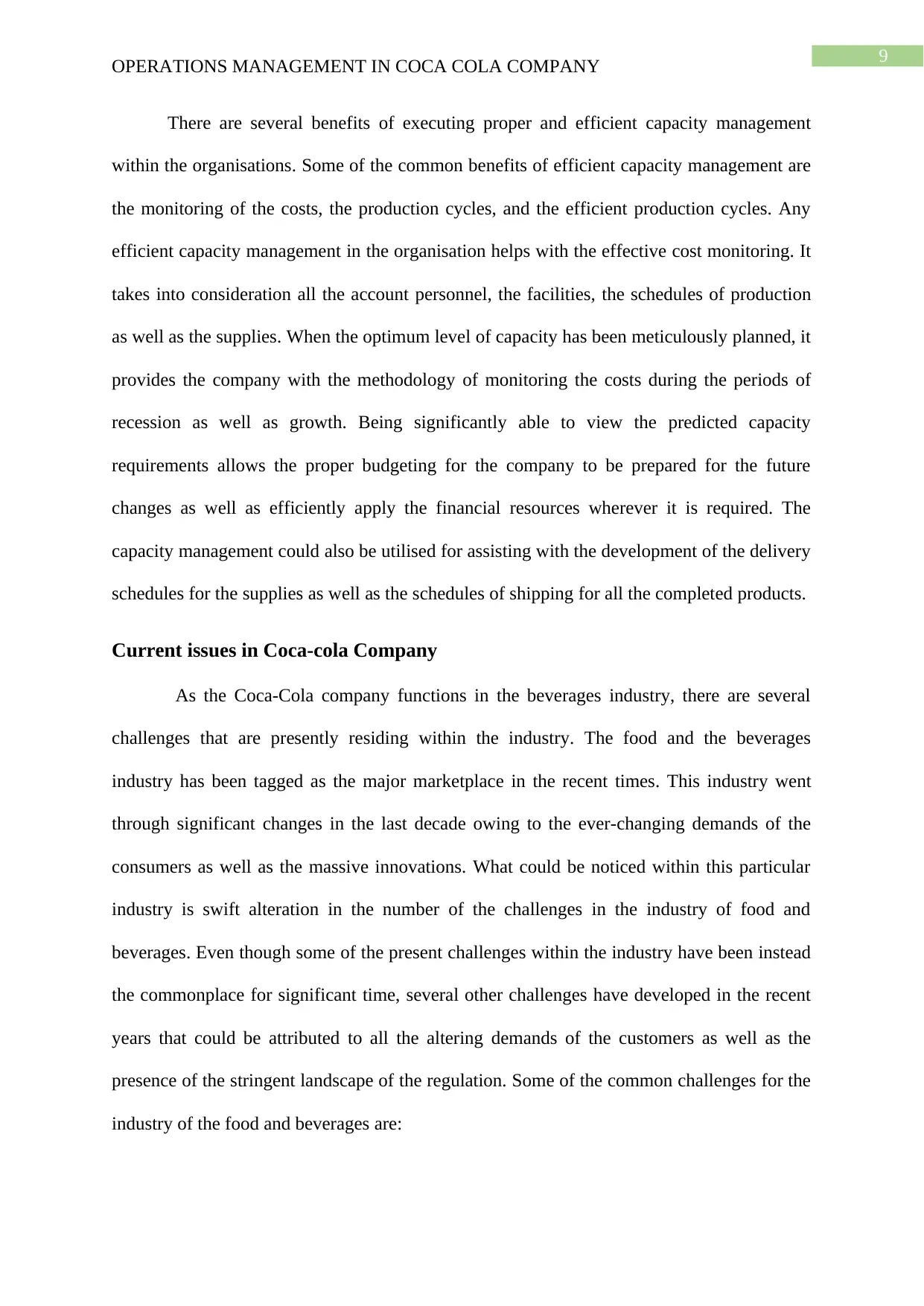
9
OPERATIONS MANAGEMENT IN COCA COLA COMPANY
There are several benefits of executing proper and efficient capacity management
within the organisations. Some of the common benefits of efficient capacity management are
the monitoring of the costs, the production cycles, and the efficient production cycles. Any
efficient capacity management in the organisation helps with the effective cost monitoring. It
takes into consideration all the account personnel, the facilities, the schedules of production
as well as the supplies. When the optimum level of capacity has been meticulously planned, it
provides the company with the methodology of monitoring the costs during the periods of
recession as well as growth. Being significantly able to view the predicted capacity
requirements allows the proper budgeting for the company to be prepared for the future
changes as well as efficiently apply the financial resources wherever it is required. The
capacity management could also be utilised for assisting with the development of the delivery
schedules for the supplies as well as the schedules of shipping for all the completed products.
Current issues in Coca-cola Company
As the Coca-Cola company functions in the beverages industry, there are several
challenges that are presently residing within the industry. The food and the beverages
industry has been tagged as the major marketplace in the recent times. This industry went
through significant changes in the last decade owing to the ever-changing demands of the
consumers as well as the massive innovations. What could be noticed within this particular
industry is swift alteration in the number of the challenges in the industry of food and
beverages. Even though some of the present challenges within the industry have been instead
the commonplace for significant time, several other challenges have developed in the recent
years that could be attributed to all the altering demands of the customers as well as the
presence of the stringent landscape of the regulation. Some of the common challenges for the
industry of the food and beverages are:
OPERATIONS MANAGEMENT IN COCA COLA COMPANY
There are several benefits of executing proper and efficient capacity management
within the organisations. Some of the common benefits of efficient capacity management are
the monitoring of the costs, the production cycles, and the efficient production cycles. Any
efficient capacity management in the organisation helps with the effective cost monitoring. It
takes into consideration all the account personnel, the facilities, the schedules of production
as well as the supplies. When the optimum level of capacity has been meticulously planned, it
provides the company with the methodology of monitoring the costs during the periods of
recession as well as growth. Being significantly able to view the predicted capacity
requirements allows the proper budgeting for the company to be prepared for the future
changes as well as efficiently apply the financial resources wherever it is required. The
capacity management could also be utilised for assisting with the development of the delivery
schedules for the supplies as well as the schedules of shipping for all the completed products.
Current issues in Coca-cola Company
As the Coca-Cola company functions in the beverages industry, there are several
challenges that are presently residing within the industry. The food and the beverages
industry has been tagged as the major marketplace in the recent times. This industry went
through significant changes in the last decade owing to the ever-changing demands of the
consumers as well as the massive innovations. What could be noticed within this particular
industry is swift alteration in the number of the challenges in the industry of food and
beverages. Even though some of the present challenges within the industry have been instead
the commonplace for significant time, several other challenges have developed in the recent
years that could be attributed to all the altering demands of the customers as well as the
presence of the stringent landscape of the regulation. Some of the common challenges for the
industry of the food and beverages are:
Secure Best Marks with AI Grader
Need help grading? Try our AI Grader for instant feedback on your assignments.
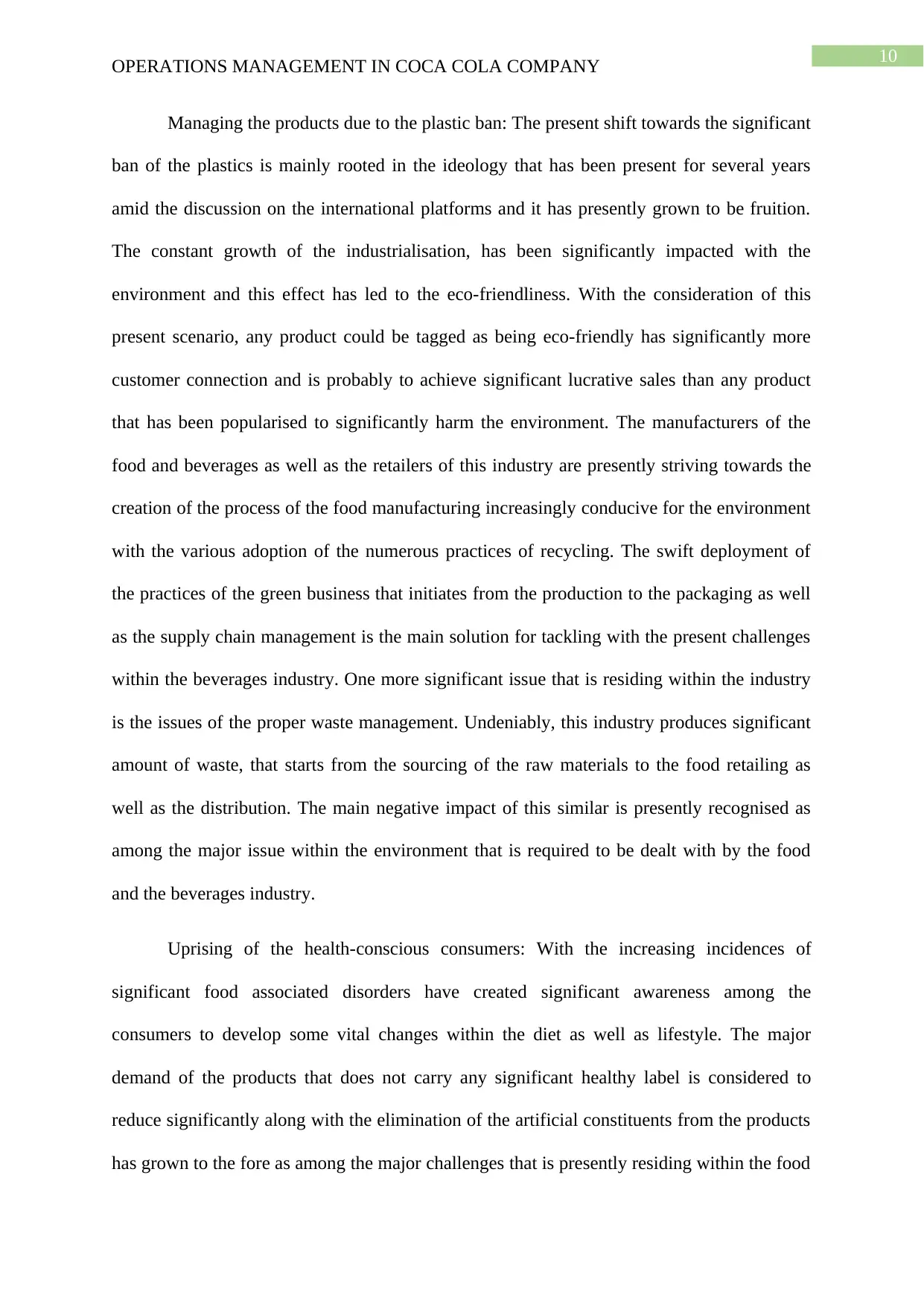
10
OPERATIONS MANAGEMENT IN COCA COLA COMPANY
Managing the products due to the plastic ban: The present shift towards the significant
ban of the plastics is mainly rooted in the ideology that has been present for several years
amid the discussion on the international platforms and it has presently grown to be fruition.
The constant growth of the industrialisation, has been significantly impacted with the
environment and this effect has led to the eco-friendliness. With the consideration of this
present scenario, any product could be tagged as being eco-friendly has significantly more
customer connection and is probably to achieve significant lucrative sales than any product
that has been popularised to significantly harm the environment. The manufacturers of the
food and beverages as well as the retailers of this industry are presently striving towards the
creation of the process of the food manufacturing increasingly conducive for the environment
with the various adoption of the numerous practices of recycling. The swift deployment of
the practices of the green business that initiates from the production to the packaging as well
as the supply chain management is the main solution for tackling with the present challenges
within the beverages industry. One more significant issue that is residing within the industry
is the issues of the proper waste management. Undeniably, this industry produces significant
amount of waste, that starts from the sourcing of the raw materials to the food retailing as
well as the distribution. The main negative impact of this similar is presently recognised as
among the major issue within the environment that is required to be dealt with by the food
and the beverages industry.
Uprising of the health-conscious consumers: With the increasing incidences of
significant food associated disorders have created significant awareness among the
consumers to develop some vital changes within the diet as well as lifestyle. The major
demand of the products that does not carry any significant healthy label is considered to
reduce significantly along with the elimination of the artificial constituents from the products
has grown to the fore as among the major challenges that is presently residing within the food
OPERATIONS MANAGEMENT IN COCA COLA COMPANY
Managing the products due to the plastic ban: The present shift towards the significant
ban of the plastics is mainly rooted in the ideology that has been present for several years
amid the discussion on the international platforms and it has presently grown to be fruition.
The constant growth of the industrialisation, has been significantly impacted with the
environment and this effect has led to the eco-friendliness. With the consideration of this
present scenario, any product could be tagged as being eco-friendly has significantly more
customer connection and is probably to achieve significant lucrative sales than any product
that has been popularised to significantly harm the environment. The manufacturers of the
food and beverages as well as the retailers of this industry are presently striving towards the
creation of the process of the food manufacturing increasingly conducive for the environment
with the various adoption of the numerous practices of recycling. The swift deployment of
the practices of the green business that initiates from the production to the packaging as well
as the supply chain management is the main solution for tackling with the present challenges
within the beverages industry. One more significant issue that is residing within the industry
is the issues of the proper waste management. Undeniably, this industry produces significant
amount of waste, that starts from the sourcing of the raw materials to the food retailing as
well as the distribution. The main negative impact of this similar is presently recognised as
among the major issue within the environment that is required to be dealt with by the food
and the beverages industry.
Uprising of the health-conscious consumers: With the increasing incidences of
significant food associated disorders have created significant awareness among the
consumers to develop some vital changes within the diet as well as lifestyle. The major
demand of the products that does not carry any significant healthy label is considered to
reduce significantly along with the elimination of the artificial constituents from the products
has grown to the fore as among the major challenges that is presently residing within the food
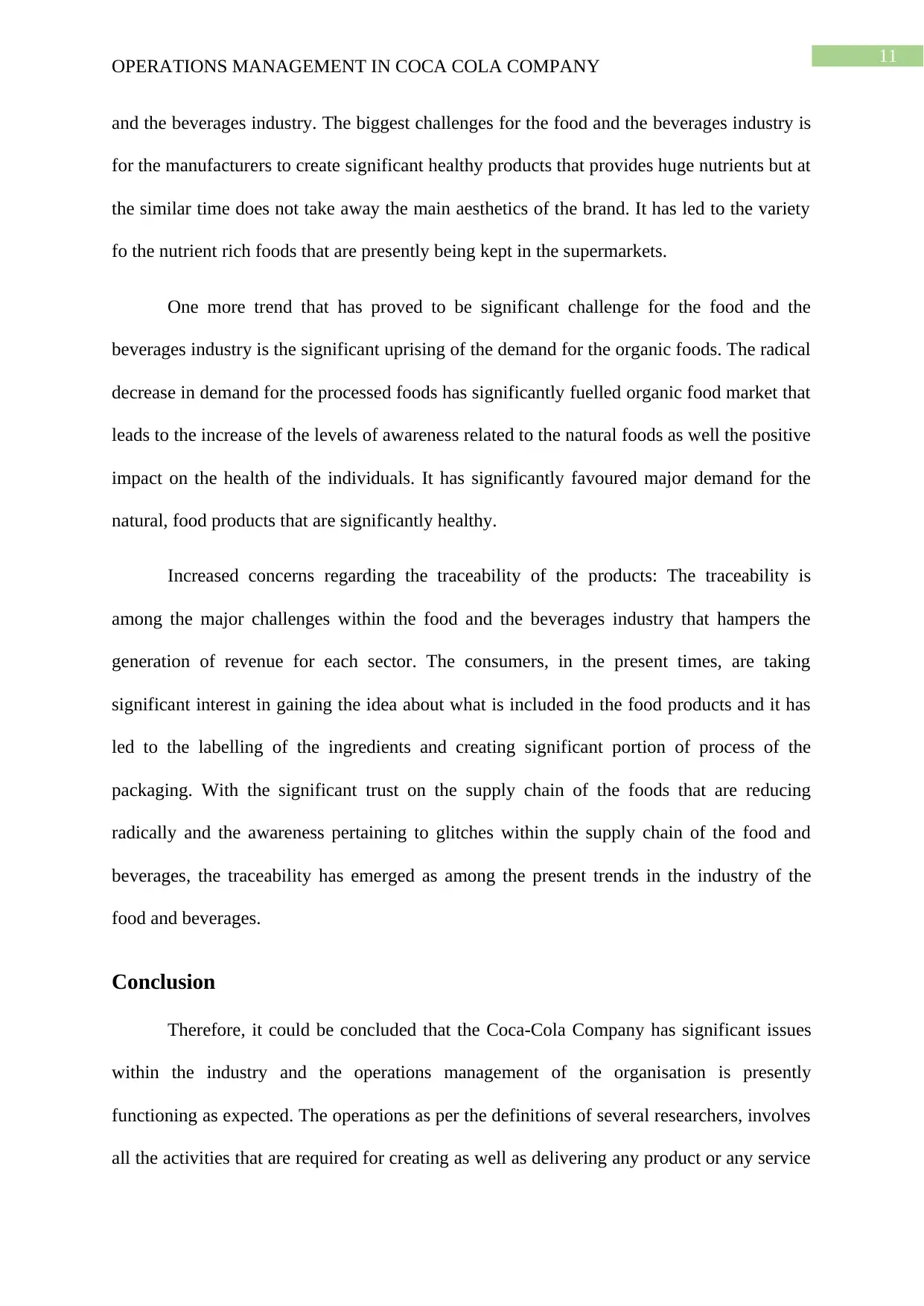
11
OPERATIONS MANAGEMENT IN COCA COLA COMPANY
and the beverages industry. The biggest challenges for the food and the beverages industry is
for the manufacturers to create significant healthy products that provides huge nutrients but at
the similar time does not take away the main aesthetics of the brand. It has led to the variety
fo the nutrient rich foods that are presently being kept in the supermarkets.
One more trend that has proved to be significant challenge for the food and the
beverages industry is the significant uprising of the demand for the organic foods. The radical
decrease in demand for the processed foods has significantly fuelled organic food market that
leads to the increase of the levels of awareness related to the natural foods as well the positive
impact on the health of the individuals. It has significantly favoured major demand for the
natural, food products that are significantly healthy.
Increased concerns regarding the traceability of the products: The traceability is
among the major challenges within the food and the beverages industry that hampers the
generation of revenue for each sector. The consumers, in the present times, are taking
significant interest in gaining the idea about what is included in the food products and it has
led to the labelling of the ingredients and creating significant portion of process of the
packaging. With the significant trust on the supply chain of the foods that are reducing
radically and the awareness pertaining to glitches within the supply chain of the food and
beverages, the traceability has emerged as among the present trends in the industry of the
food and beverages.
Conclusion
Therefore, it could be concluded that the Coca-Cola Company has significant issues
within the industry and the operations management of the organisation is presently
functioning as expected. The operations as per the definitions of several researchers, involves
all the activities that are required for creating as well as delivering any product or any service
OPERATIONS MANAGEMENT IN COCA COLA COMPANY
and the beverages industry. The biggest challenges for the food and the beverages industry is
for the manufacturers to create significant healthy products that provides huge nutrients but at
the similar time does not take away the main aesthetics of the brand. It has led to the variety
fo the nutrient rich foods that are presently being kept in the supermarkets.
One more trend that has proved to be significant challenge for the food and the
beverages industry is the significant uprising of the demand for the organic foods. The radical
decrease in demand for the processed foods has significantly fuelled organic food market that
leads to the increase of the levels of awareness related to the natural foods as well the positive
impact on the health of the individuals. It has significantly favoured major demand for the
natural, food products that are significantly healthy.
Increased concerns regarding the traceability of the products: The traceability is
among the major challenges within the food and the beverages industry that hampers the
generation of revenue for each sector. The consumers, in the present times, are taking
significant interest in gaining the idea about what is included in the food products and it has
led to the labelling of the ingredients and creating significant portion of process of the
packaging. With the significant trust on the supply chain of the foods that are reducing
radically and the awareness pertaining to glitches within the supply chain of the food and
beverages, the traceability has emerged as among the present trends in the industry of the
food and beverages.
Conclusion
Therefore, it could be concluded that the Coca-Cola Company has significant issues
within the industry and the operations management of the organisation is presently
functioning as expected. The operations as per the definitions of several researchers, involves
all the activities that are required for creating as well as delivering any product or any service
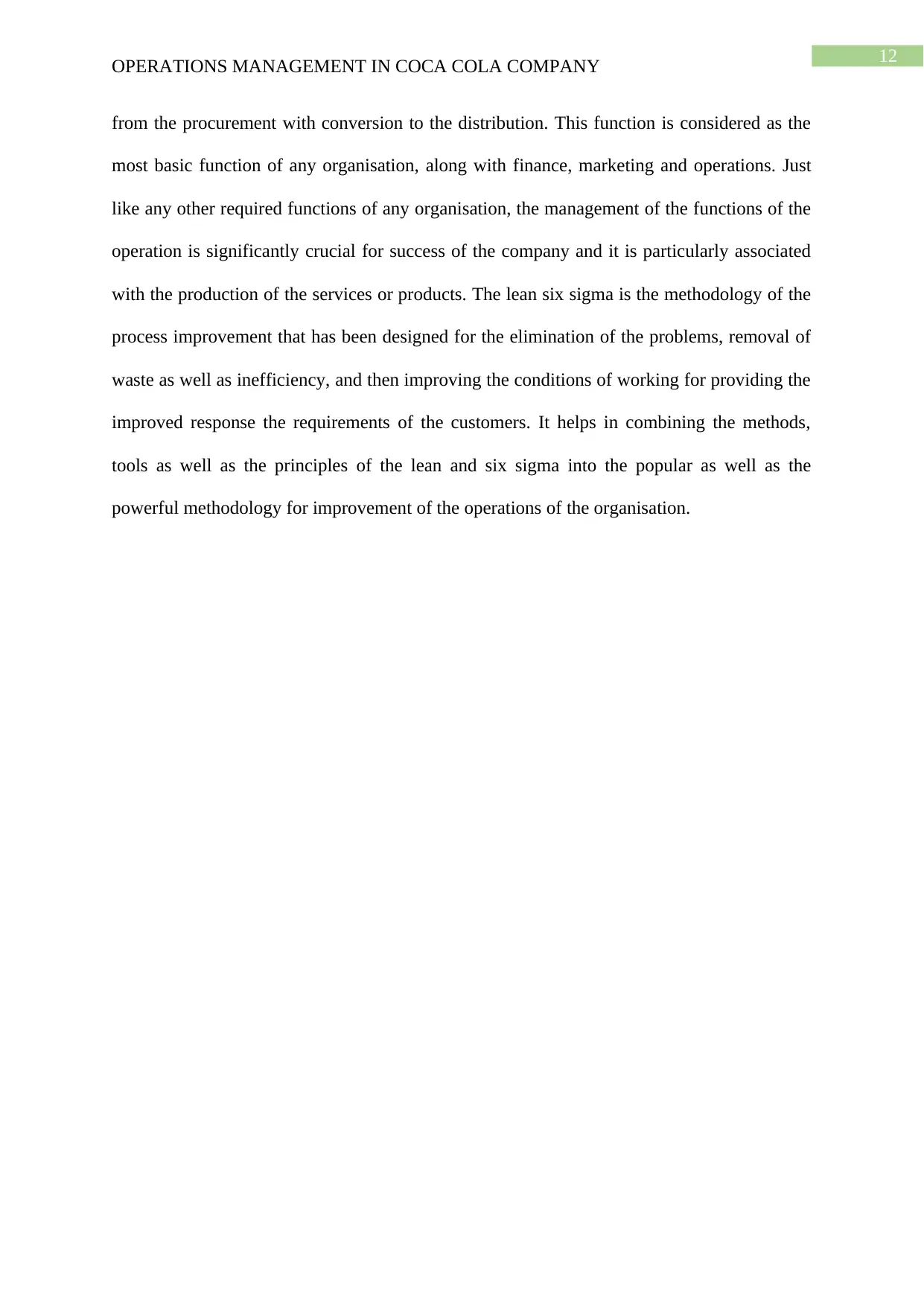
12
OPERATIONS MANAGEMENT IN COCA COLA COMPANY
from the procurement with conversion to the distribution. This function is considered as the
most basic function of any organisation, along with finance, marketing and operations. Just
like any other required functions of any organisation, the management of the functions of the
operation is significantly crucial for success of the company and it is particularly associated
with the production of the services or products. The lean six sigma is the methodology of the
process improvement that has been designed for the elimination of the problems, removal of
waste as well as inefficiency, and then improving the conditions of working for providing the
improved response the requirements of the customers. It helps in combining the methods,
tools as well as the principles of the lean and six sigma into the popular as well as the
powerful methodology for improvement of the operations of the organisation.
OPERATIONS MANAGEMENT IN COCA COLA COMPANY
from the procurement with conversion to the distribution. This function is considered as the
most basic function of any organisation, along with finance, marketing and operations. Just
like any other required functions of any organisation, the management of the functions of the
operation is significantly crucial for success of the company and it is particularly associated
with the production of the services or products. The lean six sigma is the methodology of the
process improvement that has been designed for the elimination of the problems, removal of
waste as well as inefficiency, and then improving the conditions of working for providing the
improved response the requirements of the customers. It helps in combining the methods,
tools as well as the principles of the lean and six sigma into the popular as well as the
powerful methodology for improvement of the operations of the organisation.
Paraphrase This Document
Need a fresh take? Get an instant paraphrase of this document with our AI Paraphraser
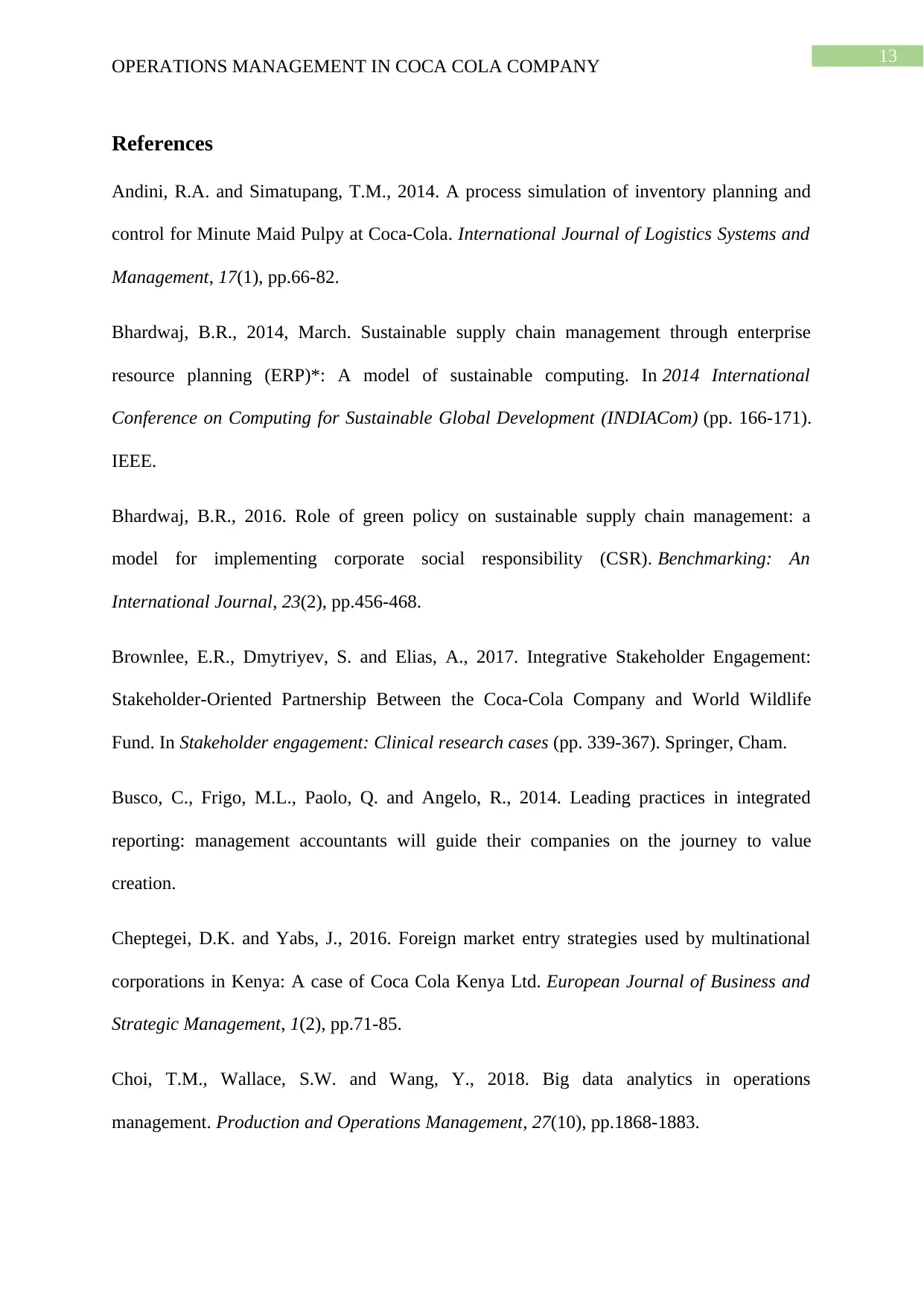
13
OPERATIONS MANAGEMENT IN COCA COLA COMPANY
References
Andini, R.A. and Simatupang, T.M., 2014. A process simulation of inventory planning and
control for Minute Maid Pulpy at Coca-Cola. International Journal of Logistics Systems and
Management, 17(1), pp.66-82.
Bhardwaj, B.R., 2014, March. Sustainable supply chain management through enterprise
resource planning (ERP)*: A model of sustainable computing. In 2014 International
Conference on Computing for Sustainable Global Development (INDIACom) (pp. 166-171).
IEEE.
Bhardwaj, B.R., 2016. Role of green policy on sustainable supply chain management: a
model for implementing corporate social responsibility (CSR). Benchmarking: An
International Journal, 23(2), pp.456-468.
Brownlee, E.R., Dmytriyev, S. and Elias, A., 2017. Integrative Stakeholder Engagement:
Stakeholder-Oriented Partnership Between the Coca-Cola Company and World Wildlife
Fund. In Stakeholder engagement: Clinical research cases (pp. 339-367). Springer, Cham.
Busco, C., Frigo, M.L., Paolo, Q. and Angelo, R., 2014. Leading practices in integrated
reporting: management accountants will guide their companies on the journey to value
creation.
Cheptegei, D.K. and Yabs, J., 2016. Foreign market entry strategies used by multinational
corporations in Kenya: A case of Coca Cola Kenya Ltd. European Journal of Business and
Strategic Management, 1(2), pp.71-85.
Choi, T.M., Wallace, S.W. and Wang, Y., 2018. Big data analytics in operations
management. Production and Operations Management, 27(10), pp.1868-1883.
OPERATIONS MANAGEMENT IN COCA COLA COMPANY
References
Andini, R.A. and Simatupang, T.M., 2014. A process simulation of inventory planning and
control for Minute Maid Pulpy at Coca-Cola. International Journal of Logistics Systems and
Management, 17(1), pp.66-82.
Bhardwaj, B.R., 2014, March. Sustainable supply chain management through enterprise
resource planning (ERP)*: A model of sustainable computing. In 2014 International
Conference on Computing for Sustainable Global Development (INDIACom) (pp. 166-171).
IEEE.
Bhardwaj, B.R., 2016. Role of green policy on sustainable supply chain management: a
model for implementing corporate social responsibility (CSR). Benchmarking: An
International Journal, 23(2), pp.456-468.
Brownlee, E.R., Dmytriyev, S. and Elias, A., 2017. Integrative Stakeholder Engagement:
Stakeholder-Oriented Partnership Between the Coca-Cola Company and World Wildlife
Fund. In Stakeholder engagement: Clinical research cases (pp. 339-367). Springer, Cham.
Busco, C., Frigo, M.L., Paolo, Q. and Angelo, R., 2014. Leading practices in integrated
reporting: management accountants will guide their companies on the journey to value
creation.
Cheptegei, D.K. and Yabs, J., 2016. Foreign market entry strategies used by multinational
corporations in Kenya: A case of Coca Cola Kenya Ltd. European Journal of Business and
Strategic Management, 1(2), pp.71-85.
Choi, T.M., Wallace, S.W. and Wang, Y., 2018. Big data analytics in operations
management. Production and Operations Management, 27(10), pp.1868-1883.
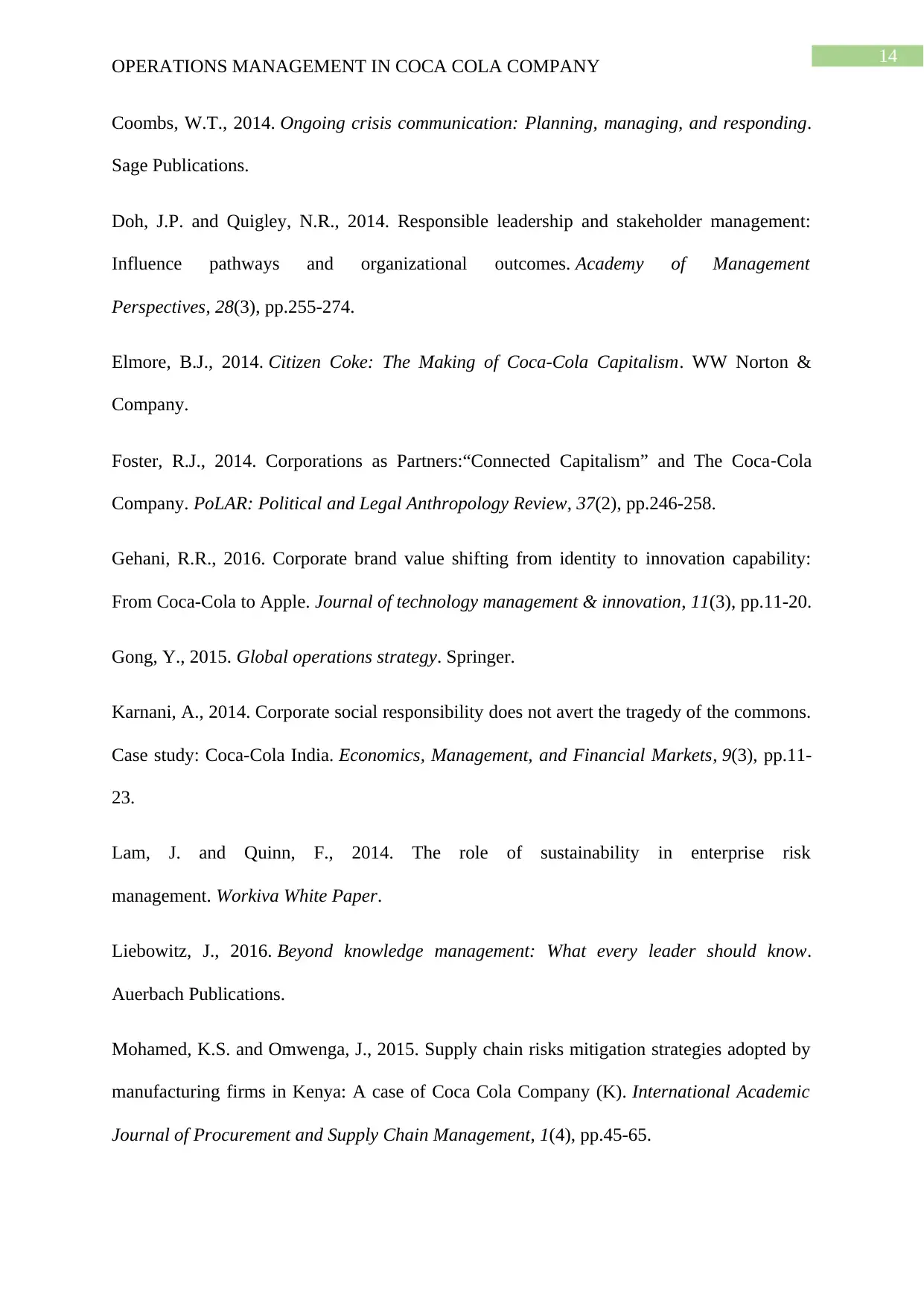
14
OPERATIONS MANAGEMENT IN COCA COLA COMPANY
Coombs, W.T., 2014. Ongoing crisis communication: Planning, managing, and responding.
Sage Publications.
Doh, J.P. and Quigley, N.R., 2014. Responsible leadership and stakeholder management:
Influence pathways and organizational outcomes. Academy of Management
Perspectives, 28(3), pp.255-274.
Elmore, B.J., 2014. Citizen Coke: The Making of Coca-Cola Capitalism. WW Norton &
Company.
Foster, R.J., 2014. Corporations as Partners:“Connected Capitalism” and The Coca‐Cola
Company. PoLAR: Political and Legal Anthropology Review, 37(2), pp.246-258.
Gehani, R.R., 2016. Corporate brand value shifting from identity to innovation capability:
From Coca-Cola to Apple. Journal of technology management & innovation, 11(3), pp.11-20.
Gong, Y., 2015. Global operations strategy. Springer.
Karnani, A., 2014. Corporate social responsibility does not avert the tragedy of the commons.
Case study: Coca-Cola India. Economics, Management, and Financial Markets, 9(3), pp.11-
23.
Lam, J. and Quinn, F., 2014. The role of sustainability in enterprise risk
management. Workiva White Paper.
Liebowitz, J., 2016. Beyond knowledge management: What every leader should know.
Auerbach Publications.
Mohamed, K.S. and Omwenga, J., 2015. Supply chain risks mitigation strategies adopted by
manufacturing firms in Kenya: A case of Coca Cola Company (K). International Academic
Journal of Procurement and Supply Chain Management, 1(4), pp.45-65.
OPERATIONS MANAGEMENT IN COCA COLA COMPANY
Coombs, W.T., 2014. Ongoing crisis communication: Planning, managing, and responding.
Sage Publications.
Doh, J.P. and Quigley, N.R., 2014. Responsible leadership and stakeholder management:
Influence pathways and organizational outcomes. Academy of Management
Perspectives, 28(3), pp.255-274.
Elmore, B.J., 2014. Citizen Coke: The Making of Coca-Cola Capitalism. WW Norton &
Company.
Foster, R.J., 2014. Corporations as Partners:“Connected Capitalism” and The Coca‐Cola
Company. PoLAR: Political and Legal Anthropology Review, 37(2), pp.246-258.
Gehani, R.R., 2016. Corporate brand value shifting from identity to innovation capability:
From Coca-Cola to Apple. Journal of technology management & innovation, 11(3), pp.11-20.
Gong, Y., 2015. Global operations strategy. Springer.
Karnani, A., 2014. Corporate social responsibility does not avert the tragedy of the commons.
Case study: Coca-Cola India. Economics, Management, and Financial Markets, 9(3), pp.11-
23.
Lam, J. and Quinn, F., 2014. The role of sustainability in enterprise risk
management. Workiva White Paper.
Liebowitz, J., 2016. Beyond knowledge management: What every leader should know.
Auerbach Publications.
Mohamed, K.S. and Omwenga, J., 2015. Supply chain risks mitigation strategies adopted by
manufacturing firms in Kenya: A case of Coca Cola Company (K). International Academic
Journal of Procurement and Supply Chain Management, 1(4), pp.45-65.
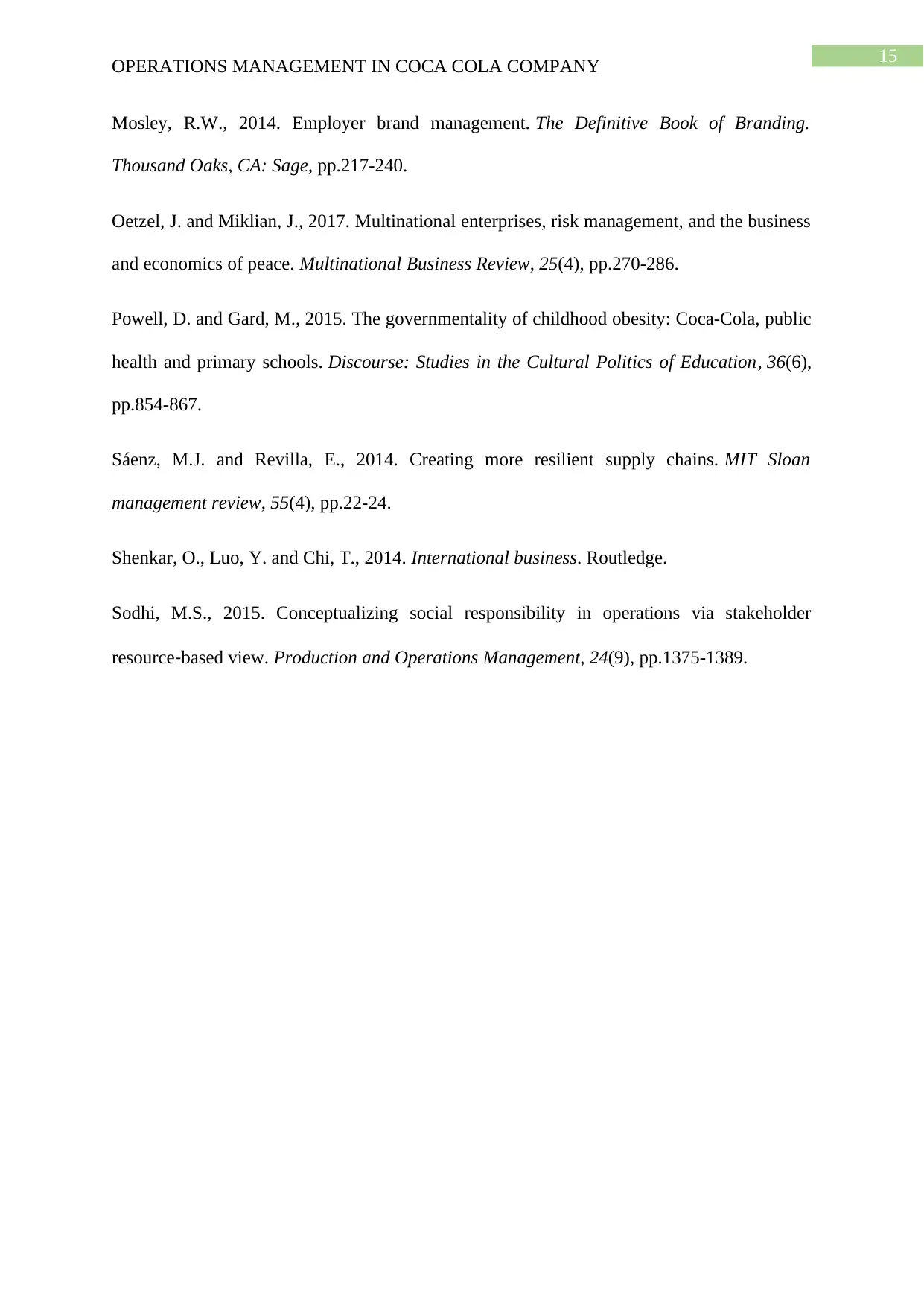
15
OPERATIONS MANAGEMENT IN COCA COLA COMPANY
Mosley, R.W., 2014. Employer brand management. The Definitive Book of Branding.
Thousand Oaks, CA: Sage, pp.217-240.
Oetzel, J. and Miklian, J., 2017. Multinational enterprises, risk management, and the business
and economics of peace. Multinational Business Review, 25(4), pp.270-286.
Powell, D. and Gard, M., 2015. The governmentality of childhood obesity: Coca-Cola, public
health and primary schools. Discourse: Studies in the Cultural Politics of Education, 36(6),
pp.854-867.
Sáenz, M.J. and Revilla, E., 2014. Creating more resilient supply chains. MIT Sloan
management review, 55(4), pp.22-24.
Shenkar, O., Luo, Y. and Chi, T., 2014. International business. Routledge.
Sodhi, M.S., 2015. Conceptualizing social responsibility in operations via stakeholder
resource‐based view. Production and Operations Management, 24(9), pp.1375-1389.
OPERATIONS MANAGEMENT IN COCA COLA COMPANY
Mosley, R.W., 2014. Employer brand management. The Definitive Book of Branding.
Thousand Oaks, CA: Sage, pp.217-240.
Oetzel, J. and Miklian, J., 2017. Multinational enterprises, risk management, and the business
and economics of peace. Multinational Business Review, 25(4), pp.270-286.
Powell, D. and Gard, M., 2015. The governmentality of childhood obesity: Coca-Cola, public
health and primary schools. Discourse: Studies in the Cultural Politics of Education, 36(6),
pp.854-867.
Sáenz, M.J. and Revilla, E., 2014. Creating more resilient supply chains. MIT Sloan
management review, 55(4), pp.22-24.
Shenkar, O., Luo, Y. and Chi, T., 2014. International business. Routledge.
Sodhi, M.S., 2015. Conceptualizing social responsibility in operations via stakeholder
resource‐based view. Production and Operations Management, 24(9), pp.1375-1389.
1 out of 16
Related Documents
Your All-in-One AI-Powered Toolkit for Academic Success.
+13062052269
info@desklib.com
Available 24*7 on WhatsApp / Email
![[object Object]](/_next/static/media/star-bottom.7253800d.svg)
Unlock your academic potential
© 2024 | Zucol Services PVT LTD | All rights reserved.




